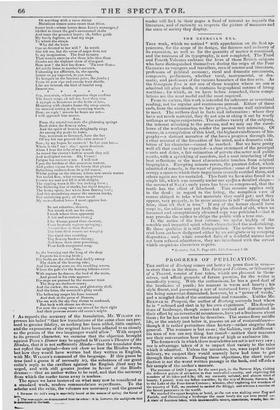THE GEORGIAN ERA.
THIS work, which we noticed * with approbation on its first ap- pearance, for the scope of its design, the fairness anti industry of
its execution, as well as for the quantity of mutter it contained, and the neatness of its typography, is now completed. The Third and Fourth Volumes embrace the lives of those British subjects
who have distinguished themselves during the reign of the Four GEORGES as voyagers and travellers, men of science and literature,
professors of political economy, rural and domestic economists, composers, performers, whether vocal, instrumental, or dra- matic, and professors of the various branches of the fine arts. As the Georgian Era is not one of those temples where no one is admitted till after death, it contains biographical notices of living worthies ; for which, as we have before remarked, these compi- lations are the most useful and the most required. From its nature, this work is intended for reference or occasional reading, not for regular and continuous perusal. Either of these ends, from the examination we have given, it seems well calculated to meet. The authors deal in facts and information : where they have not much material, they do not aim at eking it out by wordy nothings orvague conjectures. The endless variety of the subjects, the interest attaching to the persons, and we may say the excel- lence of the workmanship, render the perusal very amusing. Of course, in a compilation of this kind, the highest excellences of' bio- raphy—a distinct narrative of the hero's progress through life, a clear account of the formation of his mind, and a dramatic exhi bition of his character—cannot be reached. But we have pretty well all that could be expected—a clear statement of the principal events and dates, a fair estimation of private chalaeter and public merits, with a sprinkling of anecdote, and a neat interlacing of the best reflections or the most characteristic touches from original biographies. Excepting minute errors, the greatest defect, which admitted of remedy, is the want of proportion ; some of the persons occupy a space to which their importance scarcely entitled them, and others again are too curtailed. This fault we have also found in a single life, which was recently under our eyelin a detailed shape— the account of Sasis early years has been so compressed, that the truth has the effect of falsehood. This censure applies only to the dead : in regard to the living, the compilers were of course obliged to take what materials they could get ; and they appear, very properly, to be more anxious to tell " nothing that is false, than all that is true." If any of the former should have crept in, the editor may put forth the plea offered of old, when art incorrect and surreptitiously obtained copy was published—that it may provoke the author to oblige the public with a true one. In the notice of the first volume, we spoke highly of the sensible and impartial spirit which characterized the undertaking. By these qualities it is still distinguished. The notices we have read have not been disfigured either by an eulogistic or by a carping disposition ; and, while recorded facts of a doubtful nature have not been refused admittance, they arc introduced with the caveat which suspicious characters require.
• Si.ectab,r, VoL V. Page 133; Ill: February l32.


























 Previous page
Previous page